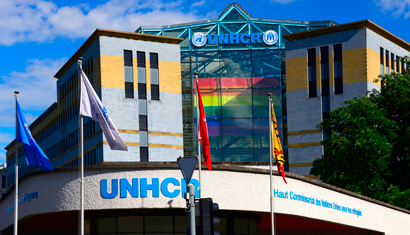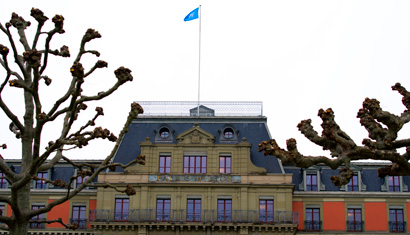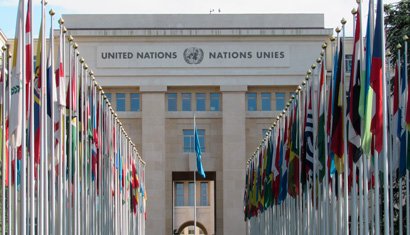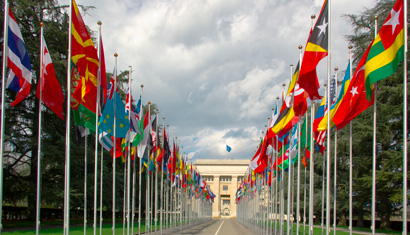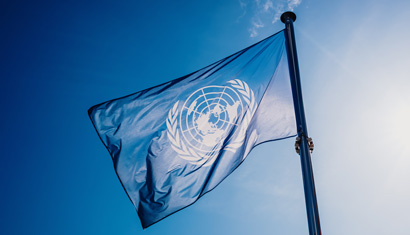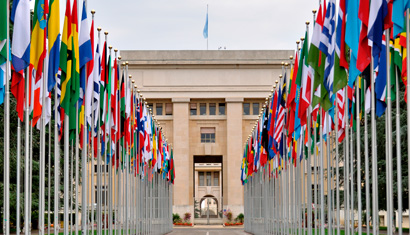Updated Working Paper – Human Rights Law Sources: UN Pronouncements on Extra-Territorial Obligations
Extra-territorial obligations (ETOs) are increasingly recognized as essential to ensuring a global framework built on human rights. As a consequence, civil society is demanding that ETOs be applied through human rights monitoring, enforcement, accountability and remedial mechanisms, resulting in a growing body of pronouncements enforcing ETOs in practice. This Working Paper, updated June 2018, outlines the application of extra-territorial obligations (ETOs) by United Nations mechanisms, including the Concluding Observations of Treaty Bodies, General Comments and Recommendations adopted by Treaty Bodies, and within the work of UN Special Procedures including Special Rapporteurs and Independent Experts appointed by the Human Rights Council. As such, it provides a current understanding of how ETOs are monitored and enforced by UN human rights mechanisms.
The Working Paper is available here.
Civil society participates in the 30th Meeting of Chairpersons of the UN Human Rights Treaty Bodies
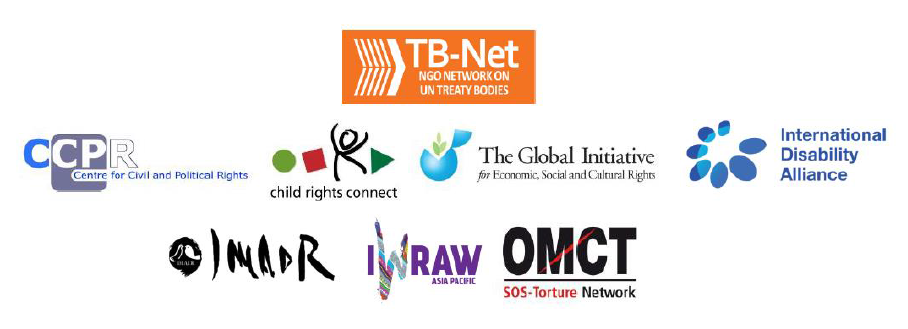
This week the Chairs of each of the UN Human Rights Treaty Bodies will meet in New York to discuss the work of the treaty bodies. Civl society will participate in the meeting to present their perspective on the work of the treaty bodies.
A group of 23 non-governmental organisations made a submission to the meeting which focuses on existing good practises in treaty body working methods and makes recommendations for building on those good practices. Access the full report here.
The Chairpersons’ meeting will take place 28 May to 1 June 2018, in New York. The Global Initiative for Economic, Social & Cultural Rights, is a member of the NGO Network on UN Treaty Bodies (TB-Net) which is an informal group of international NGOs and networks who work closely with the UN treaty bodies and have specialised expertise on their procedures and substantive work.
TB-Net will make an Oral Statement to the Chair’s meeting, highlighting our work on follow-up procedures of the treaty bodies and treaty body membership and elections.
On 1 June (13:15 - 14:45 CEST) TB-Net will host a side event in New York on ‘Promoting, quality, independence and diversity of treaty body membership'.
High Court of Uganda denies Bridge International Academies' application to suspend Ministry order to close unlicensed schools
In a judgement, dated 16 March 2018, the High Court of Uganda at Kampala denied Bridge International Academies’ (Bridge) interim injunction application seeking to maintain operations while the company’s licensing is under review. As such, all 63 Bridge schools should, by law, currently be closed in Uganda. Earlier this year, Bridge filed the injunction to challenge the directive from the Ugandan Ministry of Education that all unlicensed schools should not reopen for the 2018 academic year. In this recent ruling, the court has found that Bridge’s conduct “speaks to a high level of reckless disregard of national institutions set up to ensure qualitative education in the country.” Contrary to the responsibilities set out in the Education (Pre-Primary, Primary and Post-Primary) Act (2008), the court found that Bridge has been “operating illegally because they have no provisional or other licences” and have only initiated negotiations with the Ministry following the decision to close the schools.
This action came after several warnings by the Ministry for Bridge to comply with licencing requirements, or it would face closure. In August 2016, the Ugandan Minister of Education and Sports, formally announced that the Government would close schools operated by Bridge. In November 2016 a court order authorized the closure of the schools. Bridge did not appeal the order.
In April 2017, a Parliamentary report found that the Ministry had the authority to close private schools operating with out licences, including Bridge schools. Notices to comply with the minimum standards were issued to these institutions. In a letter of 29th January 2018, the Principal Secretary of the Ministry of Education and Sports of Uganda regretted that Bridge was feeding “false hopes” to parents by not indicating that Bridge schools would not be allowed to open.
In a press release dated 6 February 2018, the Government of Uganda reiterated that Bridge schools “will not be permitted to open/operate this school year (2018).” Despite the efforts by the Government of Uganda to implement their obligation to monitor and regulate private schools in accordance with the law, Bridge reopened for the 2018 academic year. In response to this action, civil society organisations called on the US-based company to comply with the Government decision and stop undermining the right to education.
ESC Rights Update from Geneva: 63rd session of the Committee on Economic, Social and Cultural Rights (12 to 29 March 2018)
The Committee on Economic, Social and Cultural Rights (CESCR) held its 63rd session from 12 to 29 March 2018. This Update provides a summary of the meetings and key developments.
***
State Reporting Procedure The Committee considered the State Party reports for the following States: Mexico, Niger, Bangladesh, Central African Republic, Spain and New Zealand
It was very pleasing to see Bangladesh, Niger and Central African Republic appearing before the Committee for the first time to discuss their Initial Reports. The Committee has published its Concluding Observations for all States HERE.
Pre-session The Committee’s pre-sessional Working Group met from 3 – 6 April 2018, and it adopted Lists of Issues in respect of Cameroon, Estonia, Kazakhstan, Mauritius, Slovakia.
The Lists of Issues are available HERE.
***
Communications under the OP-ICESCR The Committee has now registered 26 communications and dealt with 17 of those. The Committee has made four substantive decisions and found 12 communications inadmissible. One communication was withdrawn by the complainant.
The Committee considered 1 Communication during this session and found it inadmissible.
Jaime Efraín Arellano Medina v Ecuador (7/2015) (E / C.12 / 63 / D / 7/2015).
The case was against Ecuador and involved allegations of violations of the rights to work (Art 6), to just and favourable conditions of work (Art 7) and to health (Art 12). The author was an employee of the Ecuadorian State Petroleum Corporation, ‘Petroecuador’, for 30 years. In 2007 he filed a petition for termination of the employment relationship under the Labour Code because, he said, the company did not maintain the minimum cleaning conditions and adequate measures for the handling of chemical and harmful substances.
The author contended that he was entitled to a workers’ compensation payment pursuant to the relevant collective agreement, in addition to his entitlement under the Labour Code. The employer paid the author an amount pursuant to his Labour Code entitlement but not pursuant to the collective agreement. The author took the dispute to Court and was successful at first and second instance. The State appealed again and the National Court of Justice dismissed the author’s claim. The author then brought a claim to theConstitutional Court, which on April 9, 2014, declared that there was no violation of constitutional rights.
The State argued that the Communication was inadmissible on the grounds that:
-
domestic remedies were not exhausted by the author - Art 3(1);
-
it was not filed within one year after the exhaustion of domestic remedies - Art 3(2)(a);
-
the relevant facts occurred in October 2007, before the date of entry into force of the Protocol Optional for Ecuador (May 5, 2013) – Art 3(2)(b); and
-
the allegations of violations of Articles 6 & 7 were manifestly unfounded and did not demonstrate a violation of the Covenant rights - Art 3(2)(e).
In relation to Article 3(1) of the Optional Protocol, the State alleged that the author had failed to pursue available domestic remedies with respect to his claim of damage to his health due to the working conditions. The State described specific domestic processes available to the author, which were not pursued by the author. The Committee found that the author had not convincingly refuted that the domestic remedies mentioned by the State party would not have been effective in remedying the alleged violations. Therefore, the Committee found that the author did not exhaust all remedies available in the domestic jurisdiction with respect to the right to health allegations and therefore those allegations were inadmissible under Article 3(1).
In relation to admissibility under Article 3(2)(a), the State contended that the decision of the Constitutional Court should not be considered a ‘domestic remedy’ because it was the National Court of Justice that terminated the labour law proceedings and the petition to the Constitutional Court dealt only with alleged violations of Constitutional Rights. The Committee disagreed and found that ‘domestic remedies’ are those remedies available to author within the domestic jurisdiction, ordinary and extraordinary, directly related to the initial events that gave rise to the alleged violation, and prima facie can be reasonably considered as effective to repair the alleged violations of the Covenant. Therefore, domestic remedies were exhausted with the ruling of the Constitutional Court of April 9, 2014 and the Communication was submitted within the 1 year time period.
In relation to Article 3(2)(b) of the Optional Protocol, it is sufficient for the relevant facts to continue after the date of entry into force (even if they commenced before that date) and judicial or administrative decisions of national authorities are also considered part of ‘the facts’ under Article 3(2)(b): when they are the result of processes directly related to the initial events, acts or omissions, which gave rise to the violation; and provided they can repair the alleged violation, according to the law applicable. The Committee found that the judgment of the Constitutional Court of April 9, 2014, met these criteria and therefore the Communication was admissible pursuant to Article 3(2)(b).
Finally, in relation to Article 3(2)(e), the Committee said the author’s claim at its core questioned the interpretation of Ecuadorian law by national Courts. It alleged that the National Court of Justice had incorrectly applied the law with respect to the author’s entitlement to a ‘bonus’ under the collective agreement (and the legal concepts of ‘labour eviction’ and ‘voluntary separation’ under Ecuadorian law). The Committee noted its own jurisprudence - that its work is confined to analysis of whether the facts, including the application of national legislation, reveal a violation by the State of Covenant rights and that it is for the domestic courts to evaluate the facts and evidence in each particular case, and to interpret the relevant legislation.
The Committee said it must only make an evidentiary assessment or an interpretation of domestic law applied to the case, when the domestic Court’s assessment is manifestly arbitrary or equivalent to a denial of justice, and has led to the violation of a Covenant right. Since there was no information provided to the Committee to suggest this, the Committee found that the author had not sufficiently substantiated his allegations regarding Articles 6 and 7 of the Covenant, and they were therefore inadmissible under Article 3(2)(e), of the Optional Protocol.
The documentation is published HERE.
***
Elections The elections for membership of the Committee on Economic, Social and Cultural Rights were held on 16 April 2018 in New York (in the ECOSOC). 9 seats were open for election.
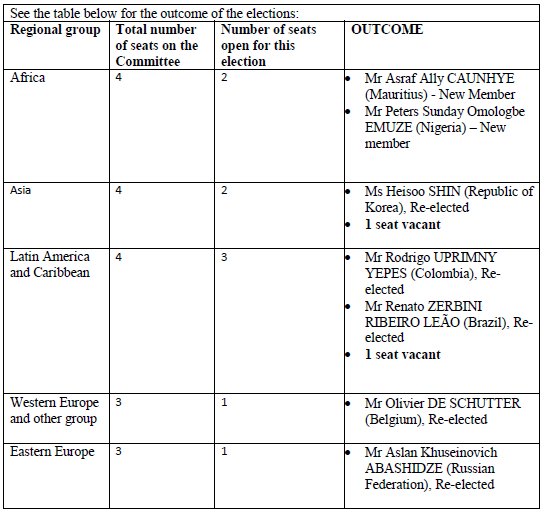
After the elections, the Committee is in the unusual situation where there are 2 seats that were open for election but no candidate was elected. The ECOSOC decided to hold a further election in July 2018 in respect of those 2 seats (Asia, GRULAC).
It is also notable that unfortunately the gender balance on the Committee has gone backwards. One female member, Ms Virginia Bras Gomes (Portugal) will be stepping down from the Committee on 31 December 2018, and another female member, Ms Shin was re-elected. The remainder of those elected were men. Unless female candidates are elected in the July elections, the Committee will have only 4 female Committee members from 2019 (out of 18 members).
Further information is available HERE.
***
Next sessions
The sixty-fourth sessionof the Committee will be held from 24 September to 12 October 2018 during which the Committee will consider the reports of:
Argentina, Cabo Verde, Germany, Mali, South Africa, Turkmenistan
The deadline for civil society submissions in respect of the review of these countries is 31 August 2018.
The Programme of Work for the 64thsession (including dates for the Dialogues) is not yet available but will be posted on the website in the coming weeks.
The following States will be reviewed in future sessions (probably 2019) but have not yet been scheduled: Bulgaria, Cameroon, Estonia, Kazakhstan, Mauritius, Slovakia, Switzerland, Yemen.
Exploring rights-driven approaches to accountability in education
There are three pillars to address current education challenges:
-
Increased education financing is the cornerstone of any improvement in education, in particular through improving the 4S (share, size, sensitivity and scrutiny) of education budgets;
-
Accountability; and
-
Institution building.
These three dimensions are related. For instance, increased financing is facilitated if citizens and donors trust institutions through effective accountability processes, and accountability processes require the necessary financing and institutions to be effective.
Accountability can thus play a crucial role in providing solutions to improve education systems. There are however different ways to bring about accountability, as detailed in the Global Education Monitoring report 2017. One of the most commonly promoted approaches to improve accountability relies on market or performance based accountability, in particular through privatisation of or in education. Nevertheless, these approaches have been proven to largely fail when assessed against human rights standards, in particular because potential improvements in accountability when they exist are at the cost of a major increase of inequalities, labour rights violations, or other fundamental rights.
GI-ESCR is currently researching and exploring what other forms of accountability could be promoted to improve accountability in education in a way that is respectful of human rights. Social or community-drive accountability offers interesting potential, and GI-ESCR is currently putting together a database of evaluated projects that aim at improving accountability through the mobilisation of parents or rights holders. Through these empirical data, and research into the human rights understanding of accountability, a rights-driven approach to accountability can be proposed. Such an approach can be combined with other initiatives to improve transparency and tackle corruption, such as IIEP's ETICO tools.
The following presentation provides more details. It was shown at an event on accountability in education at the World Bank Spring Meetings 2018, and builds on the outcomes of a workshop on accountability held at CIES 2018, as well as other pioneering work such as a Right to Education Initiative's background paper for the GEM report 2017.
Exploring rights-driven approaches to accountability in education from Sylvain Aubry
Kenyan court prevents attempts by Bridge International Academies to muzzle critics

Nairobi, Kenya, 23 February 2018
The High Court of Kenya at Nairobi dismissed on Tuesday the application for an interim injunction against the Kenya National Union of Teachers (KNUT) and its Secretary General, Mr Wilson Sossion, which had temporarily barred them from publicly discussing the operations of the largest chain of private schools in Kenya, Bridge International Academies, pending the hearing and final determination of the suit. This ruling is an important step to correct the attempt by the American company to silence critics in Kenya.
The case
This decision follows a case filed by Bridge in March 2017 accusing KNUT and Mr Sossion of defamation. This case followed concerns raised by Mr Sossion regarding Bridge’s lack of compliance with education standards and the profit making nature of the company. Mr. Sossion’s criticisms are however well documented in a report published by KNUT. In March 2017, Bridge secured a gag order which restrained the KNUT Secretary General and KNUT officials from publicly mentioning or engaging in constructive criticism of Bridge.
Several other reports from various independent sources, including academic researchers and journalists have made similar findings, informing the call to investors to cease support to Bridge which was signed by 174 organisations in August 2017.
In the ruling, Justice Richard Mwongo, emphasised that education was a matter of public interest that deserves a public discussion: “Not only does the constitution guarantee every child the right to basic education, it is also a fact that education is of such importance that the public are often engaged in questioning the happenings in public and private education issues at all times”
Resistance to transparency and accountability
These actions are emblematic of Bridge’s continued resistance to public scrutiny and transparency, further evidenced in the many litigation cases that it is engaged in. In a report published on 21 November 2017 by the UK parliament, Stephen Twigg MP highlighted Bridge’s “hostility to independent assessment”. In May 2016, an independent researcher, Canadian doctoral student, Curtis Riep, was arrested at the request of the company in Uganda, after Bridge issued a public notice in the local newspapers “warning” the general public of Riep’s presence. Mr. Riep was released without charge after Bridge was unable to provide any evidence to support their claims.
Bridge and its supporters have also used “aggressive” techniques to dismiss critics on social media, as the Minister of Education of Uganda, Mrs. Janet Museveni, recently qualified this month following the decision of the Government of Ugandan to close all Bridge schools in the country for failing to meet educational standards.
Linda Oduor-Noah from the East African Centre for Human Rights (EACHRights) said: “Education requires transparency and accountability, especially for actors serving marginalised groups. Trying to silence KNUT was an obvious way to avoid a public conversation about the profit and legality of the operations of Bridge. We are delighted that the judge decided to reopen that conversation, pending the final judgement.”
Zulekha Amin from the Economic and Social Rights Centre (Hakijamii) added: “The attempt Bridge made to silence its critics only reinforces the suspicions that they have a lot to hide. It is shameful that an American company like Bridge Academies comes to Kenya, runs 405 schools largely without the necessary authorisations, and then refuses to have a public and transparent debate on its operations. Kenyans will not continue to be merely point of extraction for multinational corporations.”
END
Documents:
-
High Court Ruling - Bridge International Academies Limited -vs- KNUT and Wilson Sossion
-
Information Statement on ongoing cases involving Bridge International Academies
-
Article by Ugandan Minister of Education, Mrs. Janet Museveni
-
Report by UK Parliament - DFID’s work on education: Leaving no one behind?
Contacts:
-
East African Centre for Human Rights: Linda Oduor Noah,
This email address is being protected from spambots. You need JavaScript enabled to view it. , +254701670090. -
Global Initiative for Economic Social and Cultural Rights, Sylvain Aubry,
This email address is being protected from spambots. You need JavaScript enabled to view it. , +254788289634.
Endorsed by:
-
East African Centre for Human Rights (EACHRights)
-
Economic and Social Rights Centre-Hakijamii
-
The Kenya Human Rights Commission (KHRC)
-
Global Initiative for Economic Social and Cultural Rights (GI-ESCR)
-
Transparency International-Kenya
Synthesis Note regarding States’ human rights obligations in the context of climate change
The Center for International Environmental Law (CIEL) and the Global Initiative for Economic, Social and Cultural Rights (GI-ESCR) are releasing a new Synthesis Note regarding States’ human rights obligations in the context of climate change as elaborated by the UN Human Rights Treaty Bodies in their country-specific recommendations.
The international community has recognized repeatedly the importance of States upholding their human rights obligations in the context of climate change. The Paris Agreement recalls for instance that “Parties should, when taking action to address climate change, respect, promote and consider their respective obligations on human rights”.
Consequently , the human rights obligations defined under the legally binding human rights treaties, must inform climate action. They require that climate policies and measures effectively protect the rights of those most affected by climate impacts and that the design of climate policies and measures integrates the principles of non-discrimination and meaningful public participation.
In this context, the human rights treaty bodies — established to monitor the implementation of the United Nations (UN) human rights treaties — have a critical role to play in further elaborating the existing legal obligations of States to respect, protect, and fulfill human rights, in the context of climate change.
Authored by the CIEL and GI-ESCR, this Synthesis Note introduces the role of these UN bodies and provides a detailed record of all of their climate-related recommendations.
Click here to read the full report.
You can also download our Focused Notes which offer a more specific summary and analysis of the relevant recommendations adopted by the following treaty bodies:
Please do not hesitate to share these documents with relevant colleagues.
Lucy McKernan (GI-ESCR) and Sébastien Duyck (CIEL)
Ministry of Education in Kenya finds Bridge International Academies in breach of education standards
19 July 2017 In a letter from the Ministry of Education in Kenya addressed to Bridge International Academies, it is stated that Bridge operates in breach of national education standards and regulations.
Dated 29 June 2017, the letter confirms that the curriculum used by Bridge has not been approved by the Kenya Institute of Curriculum Development. Furthermore the letter indicates that Bridge does not fall within the category of schools captured under the Registration Guidelines for Alternative Provision of Basic Education and Training (APBET). Released by the Ministry of Education in February 2016, APBET sets guidelines for the establishment, registration and monitoring of alternative schools. Therefore, the letter indicates that Bridge International Academies should instead register as private schools, to date the company has failed to fully register its schools.
The East African Centre for Human Rights have responded to the letter in a press release. Zulekha Amin, Education and Litigation Program Officer at Haki Jamii states, “It is quite unfortunate that foreign entities continue to operate without due consideration, adherence and deference to the laws of the land. Furthermore, they continue to expand their operations in full knowledge of their non-compliance. This is unacceptable. The longer we wait to address this situation, the worse off we will be.”
Boaz Waruku, Program Manager and Civil Society Education Fund Africa Coordinator at ANCEFA added: “Bridge International Academies should dedicate resources to not only comply with regulations, but to far exceed them. The company challenges or seems to push for the lowering of basic educational standards in Kenya and other African countries in which it operates as profit is one of their major concerns. The authorities fulfil their human rights obligations by regulating these schools, as has been emphasised recently in the general comment 24 adopted by the UN in June 2017. The comment outlined state obligations in relation to the regulation of businesses such as Bridge International Academies.”
Two new blogs reflect on recent UN General Comment on Business and Human Rights
Recently the UN Committee on Economic, Social and Cultural Rights released their highly anticipated General Comment No.24 on State Obligations under the International Covenant on Economic, Social and Cultural Rights in the Context of Business Activities. General Comments offer an authoritative interpretation of international human rights law. This document contains two key paragraphs on the privatisation of social services, offering insight into the relationship between privatisation and human rights.
In a two-part blog on the Oxford Human Rights Hub, the GI-ESCR's research and legal adviser Sylvain Aubry, reflects on what the new General Comment adds to the debate on privatisation of social services. Part 1 considers what regulatory conditions must be met where private actors deliver social services, while part 2 explores the question of whether States are permitted to privatise essential services at all.
The blogs can be accessed below:

